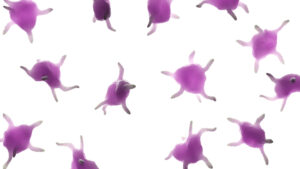The Mirasol® Pathogen Reduction Technology System (Terumo, BCT, Lakewood, CO) uses a combination of riboflavin (vitamin B2) and UV light to damage the DNA and RNA of viruses, bacteria, parasites and white blood cells. Questions remain, however, about the efficacy of platelet function after pathogen reduction. The MiPLATE clinical trial (Mirasol®-treated Apheresis Platelets in Patients with Hypoproliferative Thrombocytopenia) was designed as a non-inferiority trial comparing Mirasol® treated platelets versus conventional platelets to control bleeding (WHO >Grade 2 bleeding) in patients with a hematologic malignancy and hypoproliferative thrombocytopenia (i.e., primarily leukemia and lymphoma). Between 2017 and 2022, patients were randomized to receive either Mirasol®-treated or conventional platelets when their platelet count fell below <10,000 µL or as determined by their physicians. Based on interim-data analysis of 145 patients in the Mirasol® arm and 152 in the conventional arm who received at least one platelet transfusion, the Mirasol®-treated patients had 1.7 (4.0, SD) days of bleeding compared to 0.6 (1.5, SD) days for patients in the conventional arm (relative rate, 2.74; 95% C.I., 1.66 to 4.53) exceeding the non-inferiority margin of 1.6 for the relative rate. In addition, patients in the Mirasol® arm received 22% more transfusions than patients in the conventional arm. Further randomized controlled trials are needed to evaluate the efficacy of pathogen reduced blood products.
Reference:

